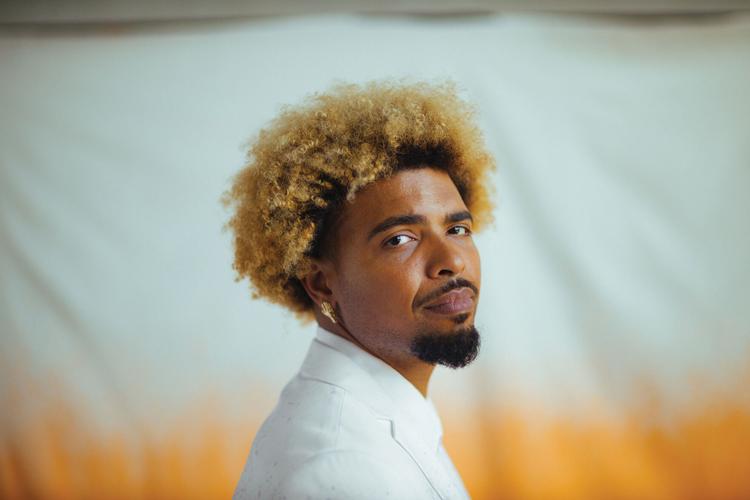
Devon Gilfillian
A feeling that lingers as the lockdown phase of COVID-19 fades into the rearview mirror is the eerie sensation of time not working the way you expect. In March 2020, the world suddenly stopped functioning the way that we’d been used to; for more than a year, it felt like everything and nothing was happening all at once. On his second LP of originals Love You Anyway, out Friday via Fantasy Records, masterful R&B singer-songwriter Devon Gilfillian attempts to crystallize some of the important things he discovered during that time.
“There was so much happening during the pandemic in my life, between my eyes opening to the world — what was happening around me, George Floyd, Breonna Taylor, and the social justice movements that I needed to recognize more — and also at that same time, I was falling out of love and back into love,” Gilfillian says, talking with the Scene by phone. “That is part of my life — reflecting what’s happening in the times, and trying to build a bridge to bring people together. But I also want to highlight the beauty and the joy happening in my life, and I’m also trying to highlight [how] I get depressed and want to just lay in that numbness at certain points, and get through it in my own ways.”
The 11 tracks on Love You Anyway blend old and new R&B style cues for a timeless flavor, and they are divided roughly into thirds by theme. The LP is front-loaded with catchy, charming love songs like “Brown Sugar Queen” and “Right Kind of Crazy,” which touch on both the excitement and the challenges of building a life with a new partner. Later Gilfillian shifts to sharing his reactions to the chaos of our world, including the hymn-like “Let the Water Flow,” inspired by the fight against voter suppression in Georgia, and “Better Broken,” which pushes against the stigma surrounding anxiety and depression. The album wraps with the one-two combo of “Righteous,” in which he’s trying to convince someone to give up ground on a position they’ve resolved to hold at any cost, and “Love You Anyway,” in which he envisions what it’s like to be someone who is trying to soften their own hard-line stance.
Writing music has always been part of Gilfillian’s process for coping with what’s painful, something he describes as being like therapy. He also points out that making music for this purpose is a time-honored tradition in the blues and R&B that he listened to growing up in a suburb of Philadelphia, where he played music in school. He went to church with his family, but the experience was more a spiritual and community-focused one than a solemn duty, the way it was for many musicians he met after moving to Nashville in 2013. Through reading about other faiths and studying the work of thinkers like Franciscan priest Richard Rohr, Gilfillian has developed a pluralistic, humanistic philosophy toward faith and contempt for the way leaders misuse it.
“[‘Righteous’] is a stab at any institution — whether it be religious institutions or government, whatever — that builds hierarchies of supremacy,” he says. “Whether that’s white supremacy, or whether that’s just supremacy in general — the Catholic church saying, ‘You are a sinner and you are bad and unworthy’ — I don’t subscribe to it. … That, to me, is important, just making [faith] not about supremacy. Everyone God loves equally, no matter what. That’s the real Christian way of looking at the world.”

Devon Gilfillian
Before he worked at channeling these ideas into Love You Anyway, Gilfillian recorded a track-for-track cover of Marvin Gaye’s 1971 masterpiece What’s Going On, one of the finest pieces of art that is also political and social commentary. Gilfillian went to a protest in the wake of George Floyd’s murder by a Minneapolis police officer, and realized he didn’t have any songs in his catalog that made sense to play at a rally or a march, so he started learning the songs on What’s Going On.
“And I was like, ‘Fuck,’ breaking down crying,” Gilfillian says. “Marvin said this shit already. He already said this shit, 50 years ago. It was so fun learning that music, but just learning it like that was horrifying, in a way. ... The wound just busting back open, that was heartbreaking.”
After a decade in Nashville, Gilfillian is pleased to see the gradual expansion of the ways we as a city celebrate different kinds of music, noting jazz jams and R&B jams popping up. However, he’s also been present for rapid growth and change in other ways in Music City, and the long-term effects of rising real estate prices remain a major concern.
“When I moved here 10 years ago, I found this spot in Woodbine for 330 bucks a month — you can’t find that anywhere nowadays. We’ve got to preserve spots for artists to live and for [communities to thrive] for a long, long time in Nashville. I hope that we fight for that and hold onto it. … I’m just trying to be more intentional on how I hold onto my musical friendships. I love Nashville because it’s easy to collaborate with people — you can just drive 10 minutes, 15 minutes down the road and get to somebody you want to write with. That’s the beauty of it, and I hope it doesn’t change.”








